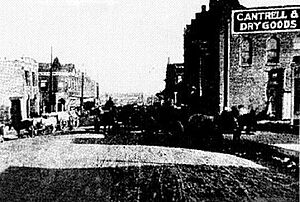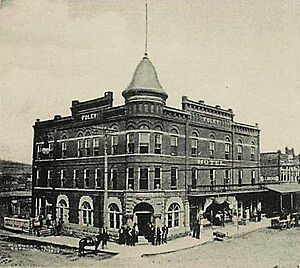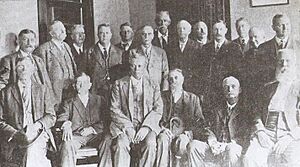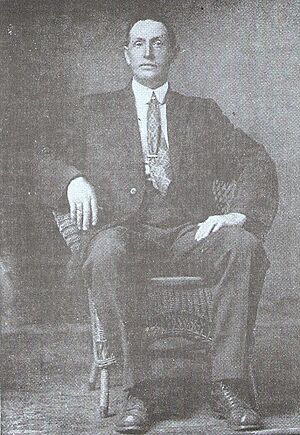McIntosh County Seat War facts for kids
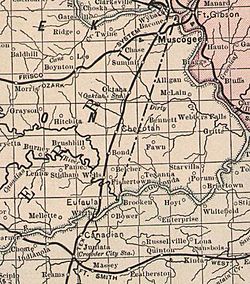
A map of the McIntosh County area from 1905.
|
|
| Date | 1907–1909 |
|---|---|
| Location | McIntosh County, Oklahoma, USA |
| Outcome | Eufaula becomes the permanent county seat. |
| Deaths | 2 |
The McIntosh County Seat War was a fight in Oklahoma that happened between 1907 and 1909. It was all about where the main government office, called the county seat, for McIntosh County should be.
After two elections, the town of Checotah was chosen as the new county seat. But the people of Eufaula refused to give up the county records. Because of this, a group of armed men from Checotah tried to take the records by force. A gunfight broke out, and the Checotah men had to give up. One year later, after another close election, Eufaula became the permanent county seat.
The County Seat War Begins
When new areas were settled in the Western United States, towns often fought to become the county seat. The county seat is like the main office for a county. It's where important government records are kept. Most of Oklahoma's "county seat wars" ended peacefully. They usually involved just strong words and close elections. But the situation in McIntosh County became much more serious.
McIntosh County was created in 1907 when Oklahoma became a state. Before that, the area was part of the Creek Nation.
On January 9, 1907, the government in Guthrie sent a message to Checotah. It said that Checotah was chosen as the temporary county seat. This was a big surprise and made the people of Checotah very happy. Being the temporary county seat gave them a better chance to become the permanent one. The whole town celebrated with dancing and ringing church bells.
But their happiness did not last long. A lawyer from Eufaula, William C. Liedtke, heard the news. On January 17, Liedtke gave a powerful speech for Eufaula. He asked for a vote to decide the matter. Eufaula received forty-two votes, and Checotah got forty-one. So, Eufaula was named the new temporary county seat. A two-story building in Eufaula became the courthouse. All the county records were moved there.
The people of Checotah were very upset. They protested, but then focused on the next election. People in Eufaula and Stidham also worked hard for their towns.
The special election was held on May 23, 1908. The first count showed Checotah had the most votes. It seemed like Checotah had won. But then, Eufaula complained that heavy rains stopped many of their voters. Also, about sixty-five ballots were missing. This made the whole election seem unfair. It caused a big argument about who really won.
In June 1908, Eufaula's lawyers went to the Oklahoma Supreme Court. They convinced Chief Justice Robert L. Williams to stop anyone from moving the county offices from Eufaula. This was until the problems with the election were fixed. One newspaper said that Checotah had a good chance to win, but Eufaula was holding on tight.
The Battle of Eufaula
W. Frank Jones was a former deputy US marshal. He lived in Checotah and strongly supported his town. When the people of Checotah heard that Eufaula had stopped the offices from moving, they decided to take action. Many wanted to use force to get what they felt was theirs.
On Sunday morning, June 7, 1908, about twenty-five armed men gathered in Checotah. Frank Jones led them. They took a special train fifteen miles south to Eufaula. They arrived around noon and split into two groups. A smaller group went to find Edward C. Julian, who had the keys to the county offices. The larger group, led by Jones, went to a main intersection. This spot gave them a good view of the courthouse.
Two Eufaula deputy city marshals, Kelser and F. M. Woods, tried to stop Jones. Jones told them to leave or he would shoot. The marshals backed off. They then warned other Eufaula men, many of whom were coming home from church. Soon, several Eufaula men armed themselves. A local hardware store owner gave guns to those who needed them.
Marshal Woods was the first person hurt in the fight. He was shot by Special Deputy Sheriff Joe Parmenter and later died. Parmenter was then shot twice. Word was sent to Grant Johnson's home. Johnson was an African-American policeman in Eufaula and a former deputy US marshal. When Johnson arrived, the Eufaula defenders were happy to have him on their side.
Johnson and Jones had worked together as law officers before. Johnson asked Jones to give up. Jones respected Johnson. He also saw that his men were outnumbered. So, Jones agreed to talk. It took a lot of convincing, but Jones got his men to put down their weapons. The Checotah men were taken prisoner. They were put on a train and sent home, about eight hours after they arrived in Eufaula.
W. R. Withington, a telephone operator, saw the fighting. He wrote about it:
Suddenly, things began to happen. The train from Muskogee and Checotah arrived in Eufaula about noon. A group of men from Checotah got off the train. They were carrying guns. They began to spread out over Eufaula to take it over. Some went to the courthouse to get the county records. Others went to different parts of town. Some came up Foley Avenue, shooting as they came. Bullets hit the telephone building. The corner of Main Street and Foley Avenue was a "no man's land." It was also the center of the battle. I hid behind the telephone switchboard. I did not come out until the shooting stopped. ... The Checotah group did not get the County records. Eufaula became the county seat of McIntosh County. Things quieted down, and I lived through this "wild and wooly" event.
After the Checotah men left, a former deputy US marshal named "General" Dunlap looked for Edward C. Julian. Julian was the county clerk and was thought to be helping Jones. Dunlap found Julian's room in the Foley Building. Within seconds, they were shooting at each other. Dunlap was badly hurt and died. Julian got away safely.
The Final Election
In total, two men died in the conflict. Joe Parmenter was wounded but got better. Frank Jones was criticized for not finishing his mission. About two weeks after the fight, Governor Charles N. Haskell announced the results of the special election. He said that more voters chose Checotah over Eufaula and Stidham combined. But it did not matter. A court order had stopped the offices from moving. It was decided that a new election had to be held to settle the matter for good.
In January 1909, a new senator named Richard A. Billups from Cordell told a story. He said he had illegally voted for Eufaula in the January 1907 election. Senator Harry Beeler of Checotah realized that Billups' illegal vote had given Eufaula the win by one point. This meant Billups was responsible for the whole fight. But Billups quickly said he was just joking.
Billups' story was still being talked about when the final election happened on February 10, 1909. Only Eufaula and Checotah were in the race. Eufaula received 1,919 votes, and Checotah got 1,844. This time, the results were not argued about. Eufaula has been the county seat of McIntosh County ever since.
Aftermath
Both Joe Parmenter and Edward C. Julian were arrested for murder. But neither of them were found guilty. Julian went back to his old job within a year. Parmenter was found not guilty in June 1909. Frank Jones went back home to Checotah. Years later, he wrote a book about his adventures as a lawman in Oklahoma. His book did not mention the McIntosh County Seat War.
In July 1925, the old courthouse in Eufaula burned down. It was rebuilt into a one-story building. Many of the county records that the towns had fought over were lost in the fire. The current McIntosh County Courthouse was built two years later in 1927. On April 14, 1988, the Eufaula Business District, which includes the Foley Building, was added to the National Register of Historic Places.
|
 | William Lucy |
 | Charles Hayes |
 | Cleveland Robinson |


